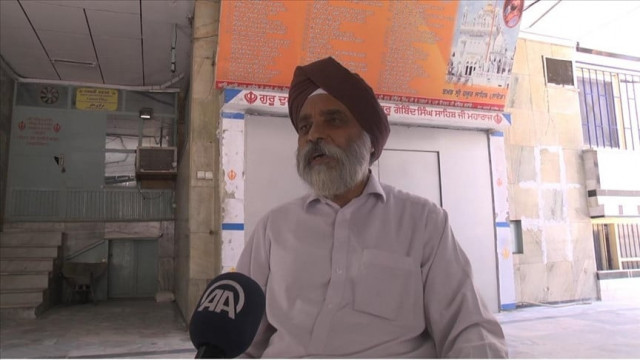Sikh community to stay in Taliban-led Afghanistan
Only 150 Sikh, Hindu families left in country with majority of members migrating to India over past 20 years

Scepticism was evident among the members of the small Sikh community at Gurdwara Bagh-e-Bala in a hilly neighbourhood of Kabul, the capital of war-torn Afghanistan, as they vowed to live in their motherland under Taliban rule.
The small Sikh and Hindu communities still living in Kabul, along with the provinces of Ghazni, Jalalabad, Khost, and Kandahar, have no plans to leave their homeland in Afghanistan and are willing to live under Taliban rule, said Manmohan Singh Sethi, vice president of the local Gurdwara Committee Kabul.
Afghanistan has approximately 35 million inhabitants, with almost 99.7% being Muslim.
Talking to Anadolu Agency, Sethi said there are only 150 Sikh and Hindu families left in the country, with the majority of their members having migrated to India over the past 20 years.
Sikh community to stay in Taliban-led Afghanistanhttps://t.co/BQT5sUzmHe pic.twitter.com/15qMQEHBlP
— ANADOLU AGENCY (@anadoluagency) September 6, 2021
Sikhs and Hindus have been living in Afghanistan for thousands of years, according to Sethi, who is a businessman.
"We don't want to leave our country, regardless of who comes to power in Afghanistan," he said. "This is, after all, our country."
Read more: Mullah Baradar to lead new Afghanistan government: Taliban sources
Some members of the group, however, desire to travel to India due to their religious ties to the South Asian country and say they were waiting for international flights to resume from Hamid Karzai International Airport in Kabul.
"We'll be sure to return to our homeland," he asserted.
Though Sikh and Hindu families in Afghanistan once numbered in the thousands, the majority left during the decades of conflict that began in 1979 with the invasion of Afghanistan by the Soviet Union.
Sikhs urge Taliban to protect minority rights
Members of Afghanistan's Sikh community have no issues living under Taliban rule, said Talwindar Singh Chawla, who traveled to Kabul with many other Sikhs and Hindus from across the country.
Read: ISI chief to meet Taliban leadership during Kabul visit
"All they want is for their rights as minorities in the country to be protected," he told Anadolu Agency.
As the Taliban made its recent lightning advances across the country, the majority of the two communities came to Kabul and stayed at a temple in the Katre Pawran neighborhood. After the capital also fell, however, a team of the Taliban went to the temple and assured them of their safety.
"I'm in constant contact with the President of the Gurdwara Committee in Kabul ... Even today, Taliban leaders came to Gurdwara Sahib and met the Hindus and Sikhs and assured them," said Chawla.
He also urged the international community, particularly Turkey, to assist minorities and help reconstruct the country.
Hindus and Sikhs in Afghanistan
Hindus and Sikhs have been living in Afghanistan for hundreds of years. Many in the communities work in trade and herbal medicine.
Also read: China will be ‘our main partner’, say Taliban
In the 1940s, Afghanistan's Sikh and Hindu population had risen to 250,000 people.
The communities were significantly decimated by the Soviet occupation in 1979 and the subsequent civil wars. Some of them settled in North America and Europe, while the majority went to India and Pakistan.
Sikhs and Hindus were ordered to wear yellow armbands and hoist yellow flags above their homes during the Taliban's first rule from 1996 to 2001.
The Taliban, allowing them to live in the country and worship according to their religion's rituals, referred to them as "dhimmah," a historical term used for non-Muslims living in an Islamic country.
The majority of Afghan Sikhs and Hindus adopted Afghan traditions in order to blend in with the culture. Some among them communicate in Pashto or Dari, which are official languages in Afghanistan, publicly but only speak Punjabi at home.
In 2018, at least 20 people were killed in a suicide bombing in the eastern city of Jalalabad, which targeted a convoy of Hindus and Sikhs.
Last year, 25 people were killed in an armed attack on a Sikh temple in the Shorbazar neighborhood of Kabul, for which Daesh, or ISIS, later claimed responsibility.
Economic crisis
"No one is left here, how can I live without my other family members," one Sikh said as he lamented the departure of relatives who had left the country or died in the fighting, citing the attacks in Jalalabad and Kabul.
He said there was nothing to do here without money as there were no jobs or business prospects.
Some members of the Sikh community own eateries near the Bagh-e-Bala temple, although they appear to be doing less business due to the current political and economic conditions.
Read: Taliban want China to play ‘huge role’ in rebuilding Afghanistan
Poverty is visible in Kabul's streets, where people beg for bread. However, there are also tall buildings with high-end shopping malls, restaurants, and apartments, demonstrating the wealth gap between the rich and the poor.
Because the government's assets are held outside the country, the Taliban are short on cash and the population lacks confidence in the incoming administration's economic policies.
Afghanistan is already blocked from accessing resources in the International Monetary Fund, including around $440 million in new financial reserves, due to a lack of clarity surrounding the country's future governance structure.
US officials have said that the Afghan central bank's roughly $10 billion in assets abroad would remain beyond the Taliban's reach.



















COMMENTS
Comments are moderated and generally will be posted if they are on-topic and not abusive.
For more information, please see our Comments FAQ